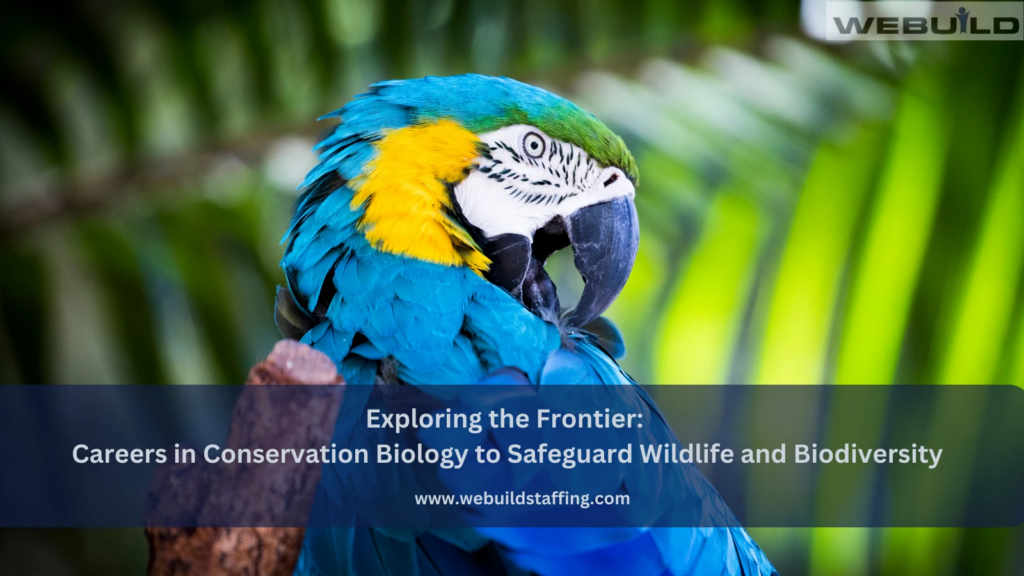The Earth is a wondrous tapestry of life, teeming with an astonishing array of creatures, plants, and ecosystems. However, this rich biodiversity faces unprecedented threats from human activities such as habitat destruction, climate change, pollution, and poaching. In the face of these challenges, conservation biology emerges as a beacon of hope, striving to protect and restore our planet’s natural heritage.Lets explore the world of conservation biology, the diverse career paths it offers and the crucial role they play in safeguarding wildlife and biodiversity.
Understanding Conservation Biology
Conservation biology is a multidisciplinary field that integrates principles from ecology, genetics, physiology, sociology, and economics to study and conserve biodiversity. At its core, conservation biology aims to understand the causes of biodiversity loss and develop effective strategies to mitigate these threats. This holistic approach encompasses a wide range of activities, from conducting scientific research and monitoring endangered species to implementing conservation policies and engaging local communities.
Career Paths in Conservation Biology
-
Conservation Scientist: Conservation scientists work on the front lines of biodiversity conservation, conducting research to better understand the ecology and behavior of endangered species. They design and implement conservation projects, analyze data, and publish their findings to inform conservation efforts.
-
Wildlife Biologist: Wildlife biologists study the behavior, distribution, and population dynamics of wild animals. They may work in diverse environments, from rainforests to deserts, using techniques such as radio telemetry, camera trapping, and DNA analysis to study elusive species and monitor their populations.
-
Conservation Geneticist: Conservation geneticists apply genetic techniques to assess the genetic diversity of endangered species, identify populations at risk of extinction, and develop strategies to enhance genetic diversity through breeding programs and translocation efforts.
-
Ecologist: Ecologists study the interactions between organisms and their environment, from individual species to entire ecosystems. They play a crucial role in ecosystem restoration, habitat management, and ecological monitoring to conserve biodiversity and restore degraded habitats.
-
Conservation Policy Analyst: Conservation policy analysts work at the intersection of science and policy, advocating for evidence-based conservation policies and regulations. They collaborate with government agencies, non-profit organizations, and international institutions to develop and implement policies that protect wildlife and their habitats.
-
Environmental Educator: Environmental educators inspire and empower the next generation of conservationists through environmental education programs, outreach activities, and field trips. They raise awareness about the importance of biodiversity conservation and foster a sense of stewardship for the natural world.
-
Conservation Planner: Conservation planners develop and implement conservation plans and land management strategies to protect critical habitats and biodiversity hotspots. They work closely with landowners, government agencies, and conservation organizations to identify conservation priorities and allocate resources effectively.
Skills and Qualifications
A career in conservation biology requires a strong foundation in biological sciences, including ecology, genetics, and wildlife biology. Additionally, interdisciplinary skills such as data analysis, GIS mapping, and project management are essential for conducting research and implementing conservation projects. Most entry-level positions require a bachelor’s degree in biology or a related field, while advanced roles may require a master’s or doctoral degree.
Passion for nature and a commitment to conservation are also crucial attributes for success in this field. Conservation biologists often work in remote and challenging environments, facing long hours, unpredictable weather, and logistical challenges. However, the rewards of protecting endangered species and preserving biodiversity far outweigh the challenges, making it a deeply fulfilling career choice for those dedicated to making a positive impact on the planet.
Challenges and Opportunities
While the field of conservation biology offers rewarding career opportunities, it also faces numerous challenges and uncertainties. Habitat loss, climate change, poaching, and invasive species continue to threaten biodiversity at an alarming rate, requiring urgent action to reverse these trends. Moreover, limited funding and political will pose significant obstacles to conservation efforts, underscoring the need for increased public awareness and advocacy.
Despite these challenges, conservation biology is a dynamic and evolving field, driven by innovation, collaboration, and resilience. Advances in technology, such as satellite imagery, drones, and genetic sequencing, are revolutionizing our ability to study and conserve wildlife. Furthermore, partnerships between governments, NGOs, and local communities are essential for implementing effective conservation strategies and achieving lasting conservation outcomes.
In conclusion, conservation biology plays a pivotal role in safeguarding wildlife and biodiversity in an increasingly human-dominated world. Careers in conservation biology offer a unique opportunity to make a tangible difference in the fight against biodiversity loss, preserving our planet’s natural heritage for future generations. By combining scientific expertise, passion for nature, and dedication to conservation, conservation biologists are at the forefront of efforts to protect and restore the web of life that sustains us all. Whether conducting field research, developing conservation policies, or inspiring the next generation of environmental stewards, conservation biologists are true guardians of our planet’s precious biodiversity.
Webuild Staffing Agency is a leading executive search and staffing agency dedicated to the construction, engineering and environmental industries. To learn more please visit: www.webuildstaffing.com


